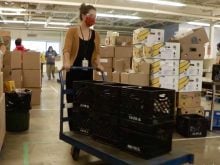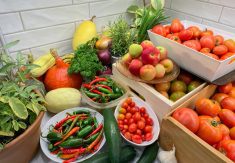Rural kids are more food secure than their counterparts in urban and northern Manitoba and more likely to eat meals with family, but when it comes to nutrition, they’re not exactly pulling ahead, according to a recent study from the University of Manitoba.
“The [study] shows there is urgent need to improve the overall diets of all Manitoba children, and address food insecurity in those from vulnerable families,” the research team said in a news release.
Why it matters: Rural teens may be nestled in the heart of food production, but that’s not necessarily reflected in what they eat each day.
Read Also

Manitoba boosts stake in cereals centre to $23.5 million
Premier Wab Kinew said the additional project funds will help ‘Trump-proof’ the provincial economy.
In late 2018 and early 2019, the team of researchers surveyed 1,600 Grade 9 students from rural, northern and urban Manitoba (First Nations communities were not surveyed). A report stemming from the project, referred to as the Food and Nutrition Security for Manitoba Youth study, was released April 4.
Respondent diets were almost universally poor, the report found, with 94 per cent eating fewer fruits and vegetables than recommended by Canada’s Food Guide. Nearly three-quarters of the students didn’t consume enough milk or milk alternatives, and nearly 60 per cent didn’t eat enough meat or alternatives. Instead, the teens ate three to five servings per day of “other” foods — junk food, sweets, sugar-sweetened drinks and fast foods.
Both rural and northern students consumed significantly more sugar, saturated fat and sodium compared to their urban counterparts, though they also consumed more vitamin C, folate and calcium.
The study also found that just over one in every eight rural kids surveyed was concerned about getting any kind of food on their plate. Thirteen per cent of rural kids reported food insecurity, though they were the smallest group of the regions.
Of the total 1,600 respondents, 20 per cent said they were food insecure, with about a quarter of that group being “severely food insecure.”
With the effects of the pandemic and subsequent food inflation, it’s likely those numbers have increased, said Joyce Slater, professor of food and human nutritional sciences at the University of Manitoba.
“Most kids are not eating a particularly healthy diet and we have to ask ourselves, is that something we’re concerned about as a province?” she said.
Food banks in Manitoba and nationwide have reported unprecedented demand in the wake of the pandemic and inflationary pressures. Last year, food charity Harvest Manitoba, which represents a network of 360 food banks and agencies in rural and urban areas, reported that one in six Manitoba households had experienced some type of food insecurity in 2021.
















